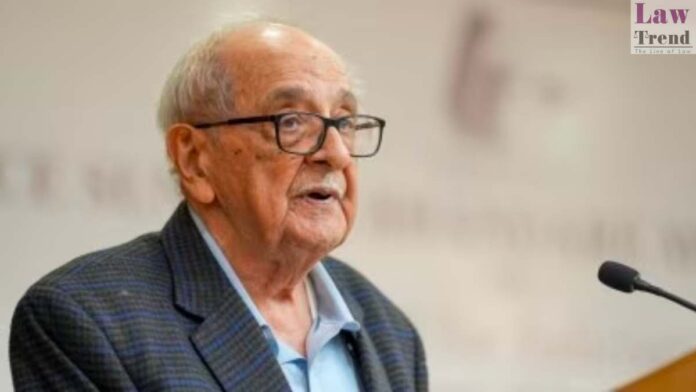The judiciary’s moral compass who blended ethicality with intellect, constitutional jurist Fali Sam Nariman will go down in legal history for his pivotal contribution to cases that have shaped India — the basic structure doctrine judgement in Kesavananda Bharati being just one of them.
Nariman, variously termed Bhishma Pitamah, conscience keeper and the man with a giant intellect, died here on Wednesday. He was 95.
The eminent jurist and author, a recipient of the Padma Vibhushan in 2007 and the Padma Bhushan in 1991, was a renowned votary of civil liberties and secularism. He was famously outspoken, a bold voice unhesitatingly taking on the state on a range of issues and articulating his views on ills plaguing the society at large.

For Nariman, a guiding light for lawyers down the decades, it didn’t matter who was in power,
Appointed additional solicitor general of India in May 1972, he resigned from the post just a day after Indira Gandhi imposed Emergency on June 26, 1975. Rare those days, and even now, this possibly deprived him of opportunities in the latter half of the career to serve the nation as the solicitor general or attorney general for India.
That forthrightness stayed his calling card right till the end.
On February 9, just 12 days before he breathed his last, Nariman spoke at an IPI-India function. A “dissident press” is a “free press” and it is essential for democracy, the nonagenarian jurist said in what was possibly his last public speech. He described India slipping ranks in the press freedom index as a “matter of grave concern for democracy”.
A week later, on February 16, Nariman wrote to lawyer Prashant Bhushan to congratulate him for his victory in the electoral bond scheme case.
“His passing away at this critical juncture is an enormous loss for our country,” Bhushan said in a post on X.
As rich tributes poured in from across the nation, Chief Justice of India D Y Chandrachud termed him a “great giant of an intellectual”.
Former CJI N V Ramana said he was a “conscience keeper for judicial institutions”.
“Through his arguments in court rooms, widely read newspaper columns, public lectures, parliamentary interventions and televised interviews he has educated generations of legal professionals and general public alike,” Ramana said in a statement.
Nariman also served as a director on the PTI Board.
Born in Rangoon (now Yangon) to a well-off business executive, he joined the Bar as a lawyer in 1950 in Bombay, now Mumbai, and remained active for over seven decades.
He initially practiced in Bombay and remained there till 1972 and then shifted to Delhi to practice law in the Supreme Court.
It was a long and illustrious legal career.
Nariman assisted Nanabhoy Palkhivala in the Kesavananda Bharati case, the most significant case in independent India. The 1973 verdict laid down “basic structure doctrine” of the Constitution, clipping the Parliament’s power to amend the Constitution and simultaneously giving the judiciary the authority to review any amendment on grounds of its violation.
After the 1984 Bhopal gas tragedy, Nariman argued in favour of the Union Carbide Corporation but was candid enough to admit later that it was a mistake. Later, he was also instrumental in getting a deal between victims and the company outside court.
He represented the Gujarat government in the Narmada Rehabilitation case, but went on to resign following news reports of attacks on Christian community and the burning of copies of the Bible.
Nariman appeared and argued in the famous TMA Pai case, Jayalalithaa disproportionate assets case and the matter of the National Judicial Appointments Commission, which was struck down by the Supreme Court.
The top court in the TMA Pai Foundation case recognised the autonomy of private educational institutions under Article 19(1)(g) of the Constitution, and allowed them to operate without excessive governmental interference.
Nariman also argued for the Supreme Court Advocates-on-record Association in its challenge to the National Judicial Appointment Commission, which was tasked with the responsibility of making judicial appointments. The top court quashed the NJAC on grounds that it violated the freedom of judiciary, one of the basic structures of the Constitution.
He was a lead counsel in the SP Gupta case, also known as the first judges cases, which finally led to the collegiums system of appointment of judges in higher judiciary.
Former Tamil Nadu CM J Jayalalitha had hired him to represent her in the disproportionate assets case. Nariman secured her bail from the top court.
Nariman was also a prolific author.
Also Read
His “Before the Memory Fades” is a professional guide for new lawyers across the nation. He has also written “The State of the Nation”, “India’s Legal System: Can it be Saved?” and “God Save the Hon’ble Supreme Court”.
Nariman was nominated as a member of the Rajya Sabha in November 1999.
Fali Nariman’s son, Rohinton Nariman, was a Supreme Court judge.
Solicitor General Tushar Mehta said the country has lost a towering figure of intellect and wisdom.
“The country has lost an epitome of what righteousness stood for. A doyen, paragon and a legend in his own lifetime has left us, leaving the jurisprudence enriched by his immense contribution. I have always learnt something new by merely appearing even against him,” the law officer said.
Away from the courtroom and legal circles, Nariman was a familiar figure for residents of Hauz Khas who would see him walk regularly, even in the cold winter months of December and January.
And on Wednesday, he just walked into the sunset. An era ended.







